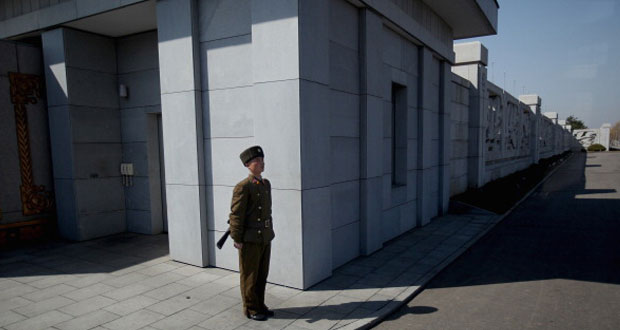North Korea’s unspeakable atrocities | Eric Metaxas

Innocent blood is crying from the ground of North Korea.
I wanted to jump for joy when I read the New York Times the other day—not something I typically feel when I read the Times, by the way. Finally, the editorial board was embracing a cause dear to my heart.
Last Tuesday, the Times threw its considerable weight behind the conclusions of the United Nations Commission of Inquiry on Human Rights in [North Korea]. The commission’s report cites hundreds of witnesses who testified to “unspeakable atrocities.”
As the Times notes, these atrocities include “murder, enslavement, torture, rape, forced abortions and persecution on political, racial and religious grounds.” The report also describes “the forcible transfer of populations, the enforced disappearance of persons and the inhumane act of knowingly causing prolonged starvation.”
And it gets worse. Some 120,000 political prisoners live in four large prison camps. The North Korean government uses starvation “to control and punish both in the camps and in the general population.” Witnesses told of “guards clubbing starving children to death for stealing rice.”
The North Korean Freedom Coalition also reported on the Commission’s findings, especially the fact that “the vast political and security apparatus . . . strategically uses surveillance, coercion, fear and punishment to preclude the expression of any dissent.”
Many North Koreans attempt escape into China, despite the “high chance that they will be apprehended and forcibly repatriated, then subject to persecution, torture . . . and in some cases sexual violence.” The babies of repatriated women “are often killed,” the Commission reported.
The Commission concluded: “The gravity, scale and nature of these violations reveal a State that does not have any parallel in the contemporary world.”
The Commission did not forget about one of the people most responsible for these crimes against humanity: North Korea’s Supreme Leader, Kim Jung-un. It informed Kim that the Commission would refer the report to the International Criminal Court “to render accountable all those, including possibly yourself, who may be responsible for the crimes against humanity.”
While I’m pleased that the UN is urging the international community to get tough on the North Korean regime for destroying the lives of its twenty-five million people, there’s a worldview irony peeking out from the pages of its report.
Nearly twenty years ago, my old friend Chuck Colson made an interesting observation about Bosnia. He noted that the international community was demanding Bosnia’s Serbian leaders be indicted for war crimes. “Good idea,” Chuck said. “But that creates a dilemma: In a world that no longer believes in God or absolute truth, by what right does the international community make such a demand?”
How can people who reject a transcendent moral order established by God turn around and insist on prosecuting people for violating this order? It is, Chuck said, “what Berkeley law professor Phillip Johnson calls the “modernist impasse”—the tension between the necessity of appealing to a higher standard and being unable to do so.
It’s something to bring up with friends, especially unsaved friends, when you talk about what’s going on in North Korea.
Meanwhile, please call your U.S. Senators and Representatives and urge them to get behind House Resolution 1771. It’s a sanctions bill targeting North Korea—something the U.N. Commission recommends. Even with the world’s attention riveted on Russia and the Ukraine, we cannot forget the tragedy in North Korea.
Additional information can be found at the North Korea Freedom Coalition.
Discuss this question with a church leader. . .
Jesus said that in the last days, because lawlessness will increase, love will grow cold (Matt. 24.12). Is there any correlation between the obvious lack of love in places like North Korea and elsewhere and the Church’s abandonment of the Law of God as the ground in which to cultivate ethics and morality which are holy and righteous and good (Rom. 7.12)?
Eric Metaxas
Metaxas is currently the voice of Breakpoint, a radio commentary (www.breakpoint.org) that is broadcast on 400 stations with an audience of eight million.
Copyright© 2014 Prison Fellowship Ministries. Reprinted with permission. BreakPoint is a ministry of Prison Fellowship Ministries





